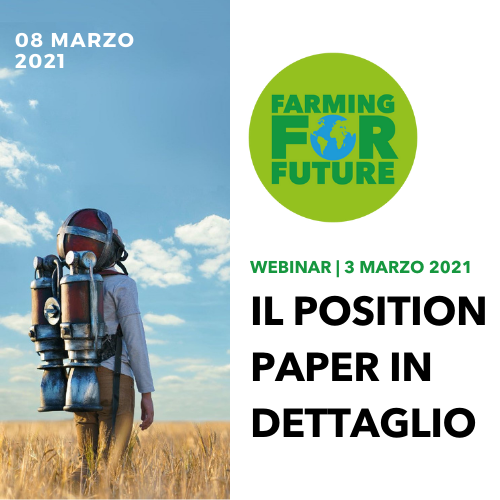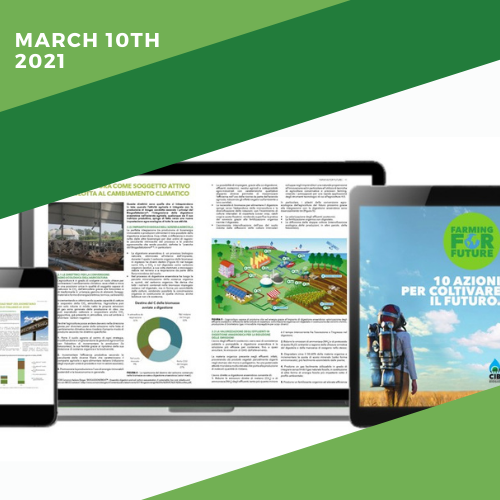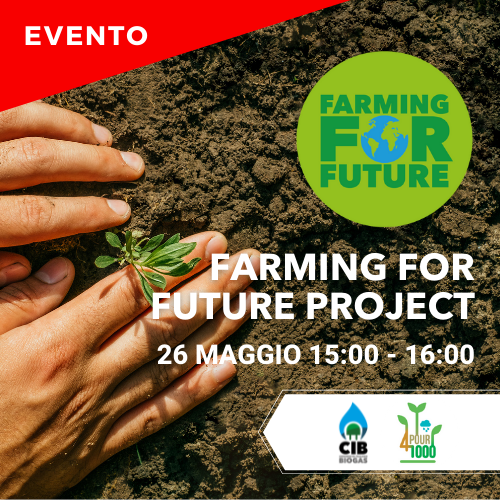WEBINAR: The position paper in depth

WEBINAR: The position paper in depth On 3 March 2021, an in-depth webinar was held to explain the Farming for Future project in more detail and to engage with the main stakeholders of the sector. Here is an excerpt of what has been published on the number 34 of Biogas Informa, magazine published by CIB – Consorzio Italiano Biogas. WEBINAR CONTENTS – EXTRACT FROM BIOGAS INFORMA “Farming for Future, comes from afar, but it took its form during the first lockdown, when it was born the desire to systematize the great wealth of knowledge and experience acquired over time, since the pioneers of biogas have included the anaerobic digester in their farm. Farming for Future was born in the countryside, where it was seen that the DA was not only a driver for innovation in energy production, but also in agronomic practices, agricultural mechanization, agriculture 4.0. Here it was understood that the soil, in addition to being a productive factor, is also a natural resource to be protected for all the ecosystem services it generates. “Agriculture is a strategic sector in the fight against climate change. Thanks to Farming for Future’s agroecological conversion”, says Piero Gattoni, “Italian agriculture will be able to contribute directly, by re- BIOGAS INFORMA – N.34/2021 | 33 ducing its emissions about 30%, and indirectly, by helping to reduce the use of fossil fuels about 6%. A potential of 31,000kt CO2/year avoided, equal to the emissions of 50% of the italian circulating car fleet. One of our objectives”, continued our president, “is to demonstrate that, in line with the European strategy, it is possible to cut emissions without renouncing to the quality productions that characterise the excellence of Made in Italy, enhancing them even more”. After the project introduction, Filippo Solibello, brilliant moderator of the morning, animated the discussion by giving the floor to the invited speakers.” https://youtu.be/bjUQBjUyhSghttps://youtu.be/pAosxzbs8bg RELATED NEWS Available the full project paper
Available the full project paper

Available the full project paper Available online is the complete Farming for Future position paper. 10 action to farm the future. BACKGROUND In October 2018, the IPCC Special Report highlighted the importance of keeping the planet’s temperature increase around 1.5°C to avoid reaching “points of no return.” To achieve this goal and to cope with possible overshoots and delays, it will be necessary to adopt a rapid action strategy involving the energy and industrial sectors. In addition, emission reduction from the use of fossil energy in all industries must be combined with initiatives aimed at removing carbon from the atmosphere, for example through the so-called ‘carbon-negative’ systems. SOIL AND AGRICULTURE The most recent IPCC Special Report on Climate Change and Land reaffirmed the importance of soiland farmingmethods as drivers of climate change mitigation. The report emphasises the need to act on agricultural production by adopting all the necessary measures to sequester carbon and reduce emissions, and considers bioenergy as one of the solutions to be deployed, provided that this is done in an appropriate and adjusted manner depending on the contexts of reference. In short, it has been acknowledged that thanks to the photosynthesis triggered by farming, the agroforestry sector is the only one capable of guaranteeing a significant sequestration level in line with the planet’s carbon cycle. Already in 2017, distinguished academics had identified farming, and the biosphere in general, as one of the “natural climate solutions” for removing atmospheric CO2, having multiple benefits and few, or no risks. As Nobel Prize winner Prof. Rattan Lal has repeatedly pointed out that, in fact, in order to feed the ever-growing population and at the same time fight climate change, it would be necessary to adopt “farming methods that produce more from fewer resources: less soil, less water, fewer nutrients.” According to Prof. Rattan Lal, the adoption of agro-ecological practices centred on soil fertility conservation and regeneration and the development of photosynthesis in cultivated and noncultivated land could potentially reduce the atmospheric concentration of CO2 by around 156 ppm in the 21st century. FARM TO FORK, BIODIVERSITY AND AGRI-FOOD With regard to the role that the agri-food sector can and must play in terms of sustainability and the fight against climate change within the European Green Deal, the Commission has indicated a number of goals in the Farm to Fork and Biodiversity strategies, one can easily agree on some of them (reduction of chemical fertilisers, pesticides, antibiotics) while others deserve deeper analysis, as they risk undermining the production potential of the European farming sector, and the Italian in particular. The concept of extensive production from cultivated land,the ‘prejudice’ against meat consumption and livestock farming – along with other issues, like the reintroduction of the ‘’set aside’’ system to safeguard biodiversity – open up a development scenario that cannot be fully embraced by an innovative and highquality farming sector such as the Italian. Italian agriculture, a world leader in high-quality foods, intends to produce more while polluting less by integrating anaerobic digestion in farms Actually, this vision for the future of agriculture and livestock has a lot in common with the goals outlined in the European strategy to improve the overall impact of farming (fewer chemical fertilisers and fewer pesticides). There are two key points to highlight, though: the conservation of the Italian livestock heritage and the intensification of production (more photosynthesis with less input per product unit), which is closely linked to the fertility of cultivated land (thanks to a positive carbon balance). Download the position paper MORE ARTICLES Three days to see the actions of Farming for Future WEBINAR: The position paper in depth
EU Green week – 4pur1000 fair host Farming for Future

4pour100 fair host Farming for Future On Wednesday May 26th at 15:00 there will be a webinar dedicated to the Farming for Future project within the series of conferences organized by the 4pour1000 Initiative, which will take place during the EU Green Week. The webinar will be held in English, participationis free. Register from this link PROGRAM Farming for Future Project and C-Farming – Guido Bezzi, CIB – Consorzio Italiano Biogas Digestate, organic carbon and soil fertility– Marco Acutis, Università di Milano Minimum tillage, CNPK fertilisation – Marco Acutis, Università di Milano Case study results: 9 years of soil monitoring at Cooperativa Speranza (Turin, Italy) – Guido Bezzi, CIB – Consorzio Italiano Biogas RELATED NEWS Available the full project paper WEBINAR: The position paper in depth